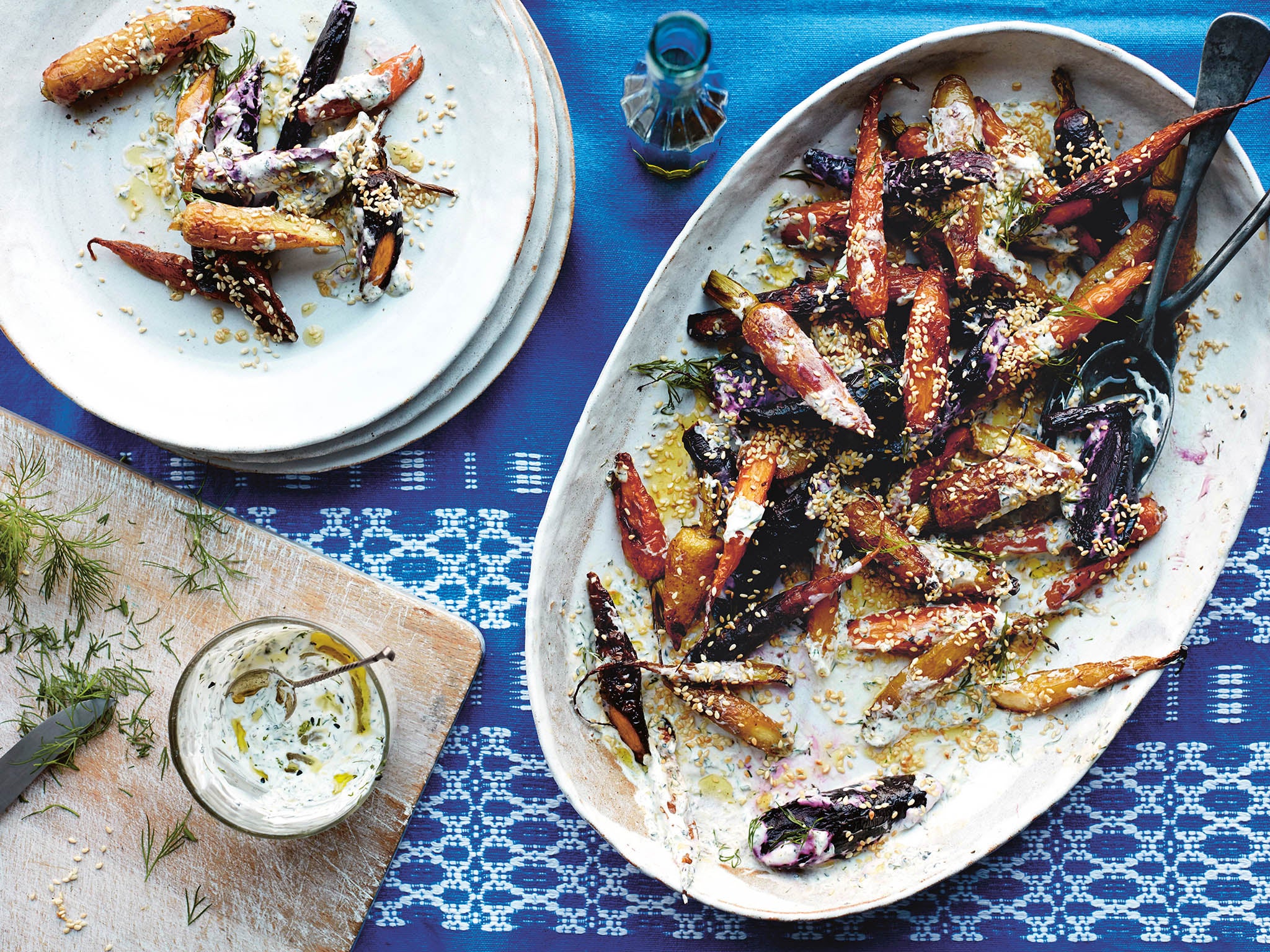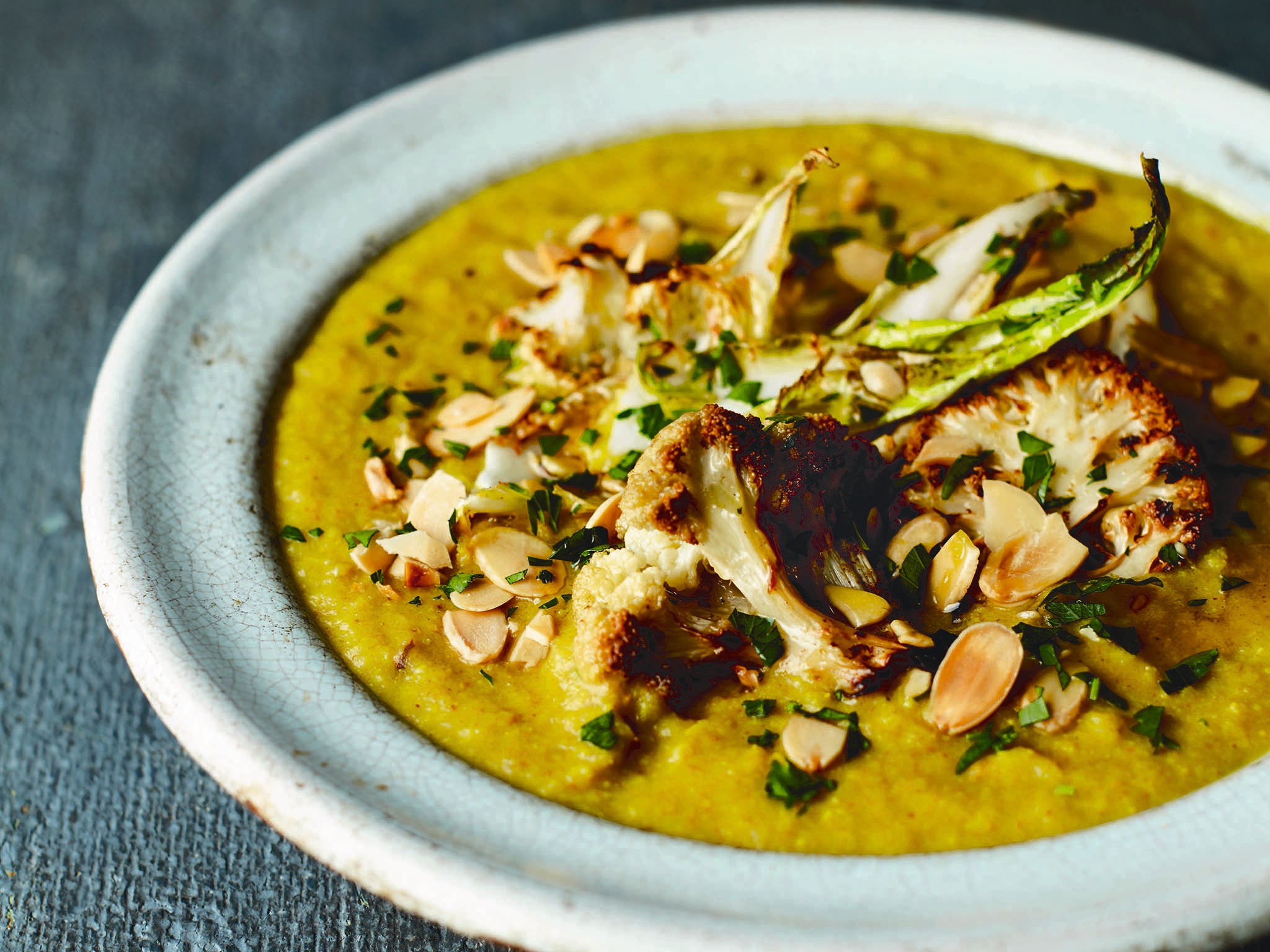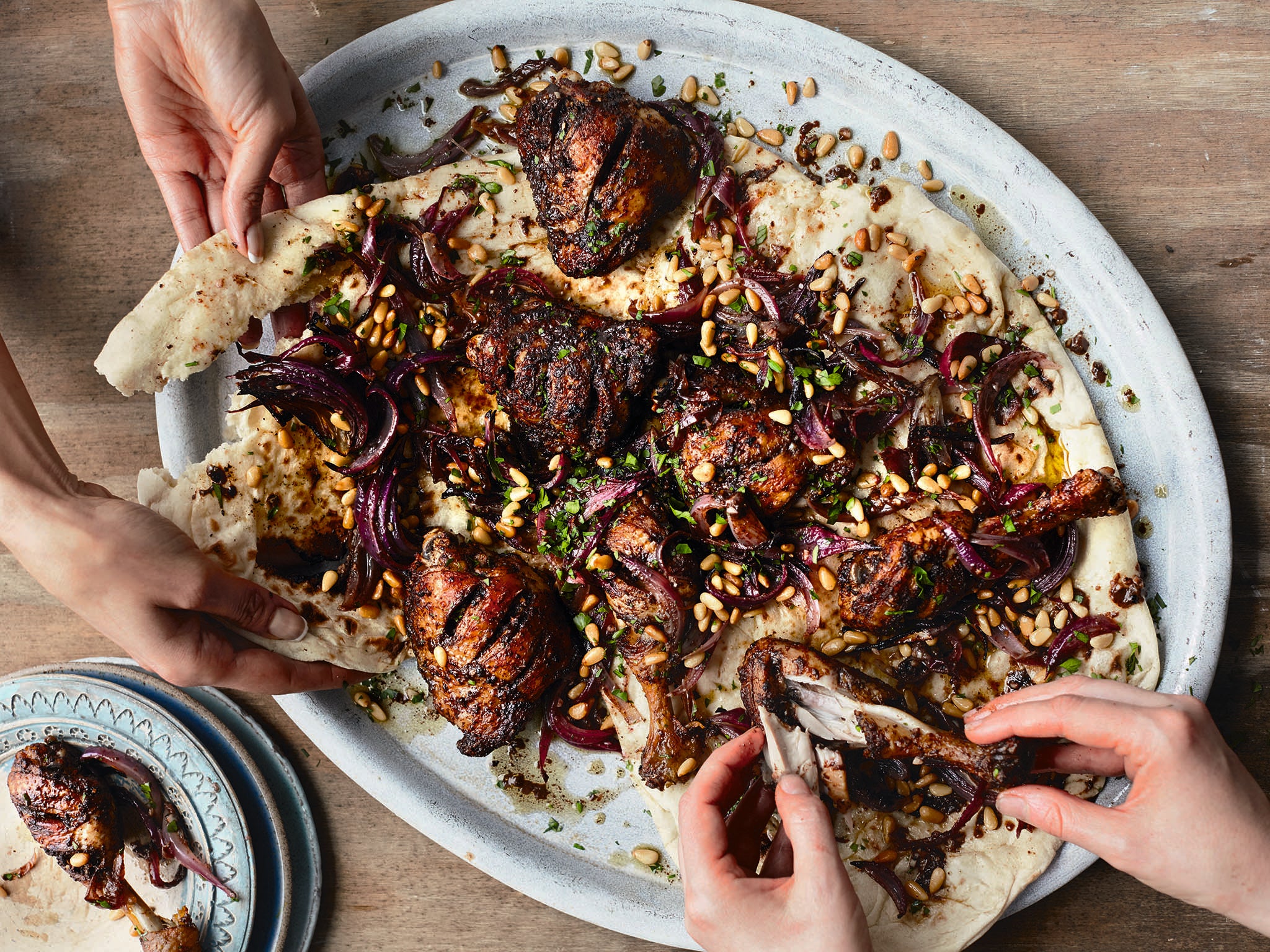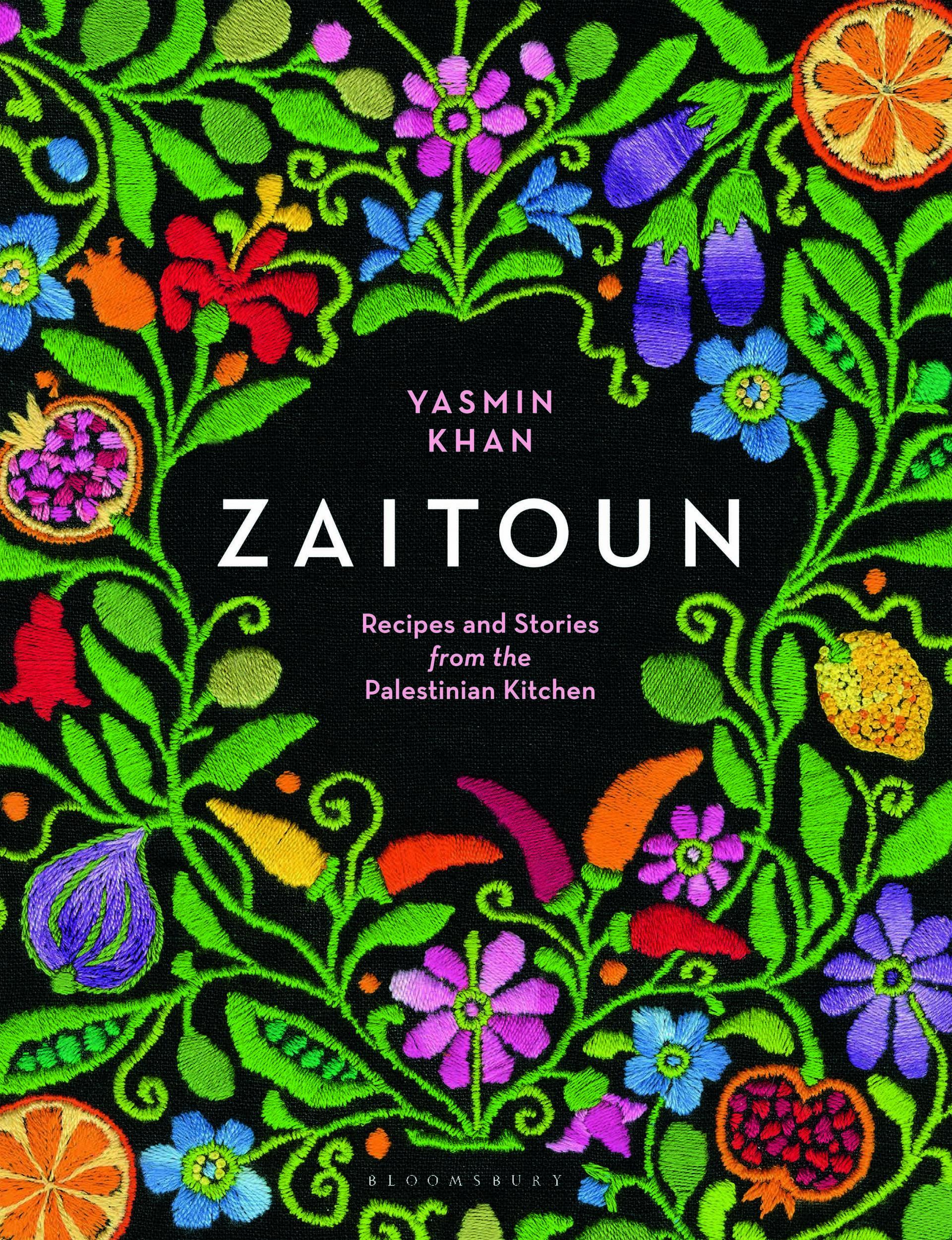Zaitoun cookbook: From rainbow carrots to sumac-roasted chicken
Yasmin Khan's second recipe book offers the best of Palestinian cuisine and is peppered with stories of the people who live there

Your support helps us to tell the story
From reproductive rights to climate change to Big Tech, The Independent is on the ground when the story is developing. Whether it's investigating the financials of Elon Musk's pro-Trump PAC or producing our latest documentary, 'The A Word', which shines a light on the American women fighting for reproductive rights, we know how important it is to parse out the facts from the messaging.
At such a critical moment in US history, we need reporters on the ground. Your donation allows us to keep sending journalists to speak to both sides of the story.
The Independent is trusted by Americans across the entire political spectrum. And unlike many other quality news outlets, we choose not to lock Americans out of our reporting and analysis with paywalls. We believe quality journalism should be available to everyone, paid for by those who can afford it.
Your support makes all the difference.Roast rainbow carrots with herbed yoghurt
This recipe is inspired by a meal I enjoyed at Tawla, a Palestinian-owned restaurant in San Francisco that serves up innovative and tasty adaptations of Eastern Mediterranean cuisine. Rainbow carrots are a particular addiction of mine and I adore how they brighten up my table with their purple and golden hues. If you can’t find any, fear not, regular carrots will do, just try and buy organic if you can as the taste is so much better. This salad is best made an hour or so in advance, then left to rest so the carrots soak up all the herby flavours from the dressing.
Serves 4 as part of a spread
1kg mixed rainbow carrots (ideally purple, white and orange)
3 tablespoons extra virgin olive oil
sea salt and freshly ground black pepper
3 tablespoons natural yoghurt
1 garlic clove, crushed
1 teaspoon finely chopped fresh dill, or ½ teaspoon dried dill
1 teaspoon dried mint
½ teaspoon nigella seeds
¾ teaspoon sesame seeds
Preheat the oven to 200°C/fan 180°C/Gas 6. Peel the carrots and slice them diagonally into thick wedges. Toss them with 2 tablespoons of the extra virgin olive oil and 1/4 teaspoon salt and roast for 30–35 minutes, until they are tender, but still have some bite.
Meanwhile, whisk together all the remaining ingredients, except the seeds, (and not forgetting the final 1 tablespoon extra virgin olive oil) with 1/4 teaspoon each salt and pepper. When the carrots are ready, transfer them to a serving dish and leave them to cool to room temperature. Pour over the yoghurt dressing, mix well, then taste and adjust the seasoning. Scatter with the nigella and sesame seeds.
You can tuck in immediately or, for best results, cover and leave to rest for about 1 hour before serving.

Roast cauliflower soup
Cauliflowers are a prized vegetable in the Palestinian kitchen, where their sweet, earthy flavour is celebrated. The most coveted varieties are known as zahra baladi (wild flower); they take a year to grow and, when harvested, are the size of my forearm. In Palestinian folklore, they are believed to cure everything from respiratory problems to post-natal pain. In this recipe, cauliflower is cooked into a thick and creamy soup, with just enough warming spice to make you feel as though it is indeed warding off all potential ailments.
Serves 4–6
1 large cauliflower (1kg)
2 onions, sliced into half moons
extra virgin olive oil
1½ teaspoons ground cumin
1½ teaspoons ground coriander
sea salt and freshly ground black pepper
30g salted butter
4 garlic cloves, crushed
1 large potato (400g), skin left on, roughly chopped into 3cm squares
1 teaspoon ground turmeric
1 litre gluten-free vegetable or chicken stock
2 tablespoons flaked almonds, to serve
chopped parsley leaves, to serve
Preheat the oven to 200°C/fan 180°C/Gas 6.
Cut the cauliflower into equal-sized florets and place them, along with any leaves, on a baking tray with the onions. Drizzle over a few tablespoons of extra virgin olive oil and sprinkle on the cumin and coriander, 1 teaspoon salt and 1/2 teaspoon pepper. Use your hands to mix everything together, then bake for around 20 minutes, or until the cauliflower is cooked through but still has some bite.
Meanwhile, melt the butter in a large saucepan and sauté the garlic for a few minutes over a low heat. Add the potato, turmeric and stock, cover and cook for 10 minutes, until the potato is soft. When the cauliflower is done, reserve a few spoons of it for the topping (including leaves, if you have them) and add the remainder to the soup. Simmer everything together for 5 minutes before blitzing with a hand-held blender until it is smooth. Taste and adjust the seasoning.
Toast the flaked almonds in a dry pan over a low heat until they turn golden. When you are ready to serve, ladle the soup into warmed bowls and top with a spoonful of roast cauliflower florets and a scattering of toasted almonds and parsley.

Roast chicken with sumac and red onions
Mussakhan is a classic Palestinian dish eaten in villages throughout the region. Traditionally the meat is laid out on a giant piece of bread with the flavoursome roasting juices poured over it, so that they seep into the dough. This platter is then placed on the table for everyone to pull off sections of bread and chicken: a wonderful sharing meal. As it can be challenging to find such large pieces of flatbread in most shops, I’ve suggested using individual naan breads instead… But, of course, if you can, seek out traditional sheets of Arabic taboon bread from Middle Eastern stores. If you are avoiding gluten, the chicken is just as delicious on its own, or served with rice or a salad.
Serves 4
1kg chicken thighs and drumsticks, skin on
3 tablespoons extra virgin olive oil, plus more to serve
½ teaspoon ground cumin
½ teaspoon ground allspice
¼ teaspoon ground cinnamon
1½ tablespoons sumac, plus more to dust
juice of 1 lemon
4 garlic cloves, crushed
sea salt and freshly ground black pepper
2 large red onions (about 500g), finely sliced into half-moons
2 tablespoons pine nuts
1 tablespoon light olive oil
naan or Arabic taboon bread, to serve
chopped parsley leaves
Slash the flesh of each piece of chicken diagonally a few times, around 2cm apart, and then place the meat in a large bowl or plastic food container. Pour over the extra virgin olive oil, spices, lemon juice, garlic, 1½ teaspoons salt and ¼ teaspoon pepper and rub this into the meat. Add the red onions and toss everything together well. Cover and leave to marinate in the fridge for 1-3 hours.
When you are ready to cook the chicken, preheat the oven to 190°C/fan 170°C/Gas 5. Transfer the meat to a baking tray and roast for about 35 minutes, or until the chicken juices run clear when pierced at their thickest part. Once the chicken is cooked, cover in foil and leave to rest while you prepare the toppings.

Fry the pine nuts in the light olive oil for a minute or so until they turn golden brown, then tip on to kitchen paper to drain.
To serve, toast the naan or taboon bread and then place the chicken and red onion on top. Finish with a smattering of pine nuts, sumac and chopped parsley. Drizzle over any remaining roasting juices so they soak into the bread, then sprinkle over a little more extra virgin olive oil.
'Zaitoun: Recipes and Stories from the Palestinian Kitchen' by Yasmin Khan is published by Bloomsbury (£26) and out now. Photography © Matt Russell
Join our commenting forum
Join thought-provoking conversations, follow other Independent readers and see their replies
Comments